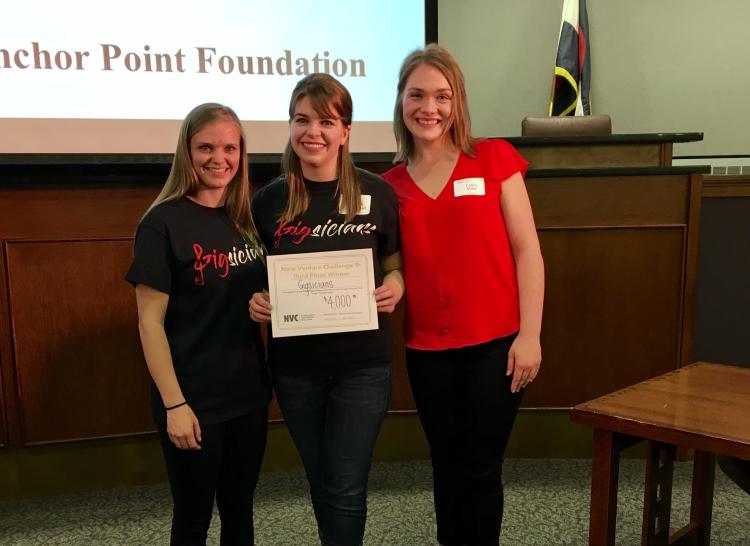Leveling the playing field

Kylie Dale, Elise Campbell and Callan Miller pose with their award after coming in third place at the CU New Venture Challenge finals.
Every really good idea had to have its genesis somewhere.
For Elise Campbell and Callan Miller, it was in a dorm room.
“It’s fun to look back on all the progress that we’ve made since then. We’re so much more confident in our purpose as musicians,” says Campbell.
The recent College of Music graduates will be spending their first summer post-undergrad building on their really good idea. And they won’t be doing it alone.
After taking the top prize in the performing arts track of the CU Boulder New Venture Challenge, the two flutists came in third at the campus-wide competition with a pitch for their online platform Gigsicians. That means they have $7,000 in their pockets to turn that idea into reality.
“But we also got some help from a venture capitalist in the area,” says Miller. “One of the judges, [former musician and cofounder of the Foundry Group] Jason Mendelson, approached us afterward and offered us an additional $5,000 to get started.”
Gigsicians began as an online gigging platform—what the founders describe as Airbnb for musicians. The problem it attempts to address is daunting: Only one percent of college music students go on to have a career in music.
The perception is that there just aren’t jobs for them. But Miller and Campbell suspected there was something more to it than that.
“Our mentor inspired us to find the root of the problem,” Campbell explains. “The private musical performance business is an $11 billion industry. It’s not that there isn’t a market for gigging musicians. There is a market—young musicians just aren’t tapping into it because they’re being told it’s not there.”
From that epiphany grew the current Gigsicians platform: an interface that educates music students on how to be professional musicians and connects them with event planners hiring for gigs. Users create profiles with biography information and audio and video clips, which event planners can then browse when they’re hiring.
The profiles are verified by the students’ primary professor. By partnering with music institutions, the Gigsicians team hopes to overcome a barrier to entry that has long plagued young musicians.
“Event planners tell us it’s too risky to hire young performers without prior experience. They are often unprofessional and unverified and don’t know the expectations of playing for an event like a wedding. It’s just easier to hire from the set vendor list that planners have always worked off of,” Miller says.
“But this way, these well-known music programs can vouch for the musicians.”
The platform offers different modules of content that students can use and customize, such as contract generation and information on arranging music for timing at events, doing your taxes as a freelance musician and distinguishing yourself from other performers. Campbell and Miller are working with computer science graduate Kylie Dale—who played flute in middle school—to build the site.
Miller says she and Campbell came to CU four years ago to be orchestral musicians, but they became interested in entrepreneurship early on with the urging of their professors.
“We couldn’t have done this without help from Jeff Nytch, Daniel Zacek, Christina Jennings, Yoriko Morita, Joan Braun and others who have mentored us along the way.”
Now, the College of Music and the Entrepreneurship Center for Music will be among Gigsicians’ first clients: After spending the summer developing content, the team hopes to launch a beta test with the ECM in the coming months.
“We also have letters of intent from Lawrence University in Wisconsin and the University of Indiana,” Miller adds, “so we’ll be able to get feedback from those schools on how the platform is working.”
Campbell says now is the time for a service like this to enter the music world.
“Musicians want to share their passion and their talents that they worked so hard to perfect. Music schools and their students are hungry for this.”


